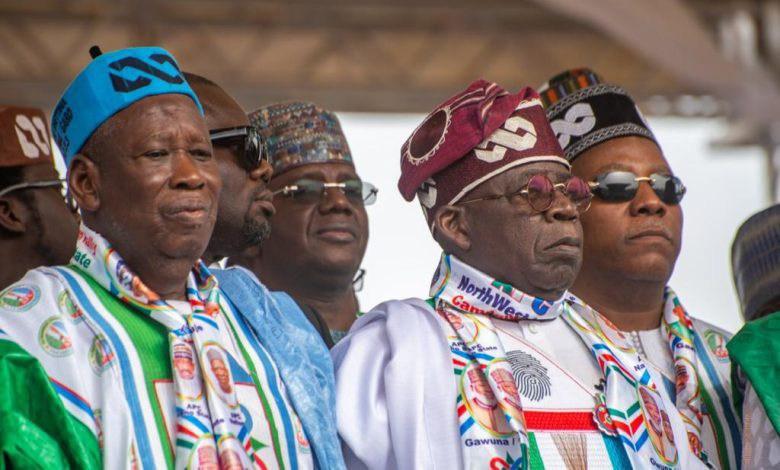The All Progressives Congress (APC), Nigeria’s ruling party, is grappling with internal turmoil following the abrupt resignation of its National Chairman, Dr. Abdullahi Umar Ganduje, and persistent speculation surrounding the potential replacement of Vice President Kashim Shettima ahead of the 2027 general elections. These developments have sparked intense political maneuvering, exposed deep rifts within the party, and raised questions about its cohesion and strategy as it navigates a critical period in Nigeria’s political landscape.
Ganduje’s Resignation: A Shock to the System
On Friday, June 27, 2025, Dr. Abdullahi Ganduje, former Governor of Kano State and APC National Chairman since August 2023, tendered his resignation, citing health reasons. However, party insiders and multiple credible sources suggest that his exit was far from voluntary. Reports indicate that Ganduje faced mounting pressure from President Bola Ahmed Tinubu, driven by strategic political calculations and dissatisfaction with his leadership.
Ganduje’s tenure was marked by controversy, including allegations of financial misconduct and mismanagement of party primaries, notably the contentious Bwari Area Council primaries in the Federal Capital Territory. His leadership also faced legal challenges, with a Kano State High Court issuing an ex-parte order in April 2024 barring him from being recognized as a party member, though a subsequent suit by the APC North-Central Forum was dismissed.
The resignation has been described as a “natural step” in the party’s evolution by the Progressive Governors’ Forum, which endorsed the move as part of ongoing reforms. However, Ganduje’s loyalists, such as Sulaiman Ibrahim, expressed disappointment, highlighting his success in attracting opposition members to the APC. Others, like Alhaji Alhassan Yaryasa, suggested that his exit might have spared him “imminent disgrace.”
Shettima’s Uncertain Fate
Compounding the party’s internal crisis are rumors that Vice President Kashim Shettima may be replaced as President Tinubu’s running mate for the 2027 elections. These speculations gained traction following a notable incident at a reception in Akwa Ibom, where Shettima conspicuously avoided shaking hands with Ganduje, a gesture interpreted as a sign of underlying tensions.
Further fueling the rumors, a recent APC North-East Stakeholders Consultative Meeting in Gombe endorsed Tinubu for a second term but made no mention of Shettima continuing as Vice President. Posts on X have amplified these speculations, with some users suggesting that Ganduje’s resignation and Shettima’s potential exit are part of a broader strategy to accommodate new political alliances.
A key figure in these discussions is Senator Rabiu Musa Kwankwaso, the 2023 presidential candidate of the New Nigeria Peoples Party (NNPP) and Ganduje’s long-time political rival. Sources claim that Tinubu has been in talks with Kwankwaso about defecting to the APC, with Ganduje’s removal as a condition for his potential entry. Buba Galadima, a close associate of Kwankwaso, hinted at a high-level meeting where both Ganduje and Shettima were “sacrificed” to facilitate this realignment. However, Kwankwaso has publicly denied plans to rejoin the APC.
Read also:
- Tinubu’s 2027 Gamble: Is replacing Shettima with Christian vice a bid for balance or a trigger for APC implosion?
- North-East APC caucus meeting ends in chaos over endorsement of Tinubu without Shettima
- Oborevwori, Okowa’s visit to Governor Diri sparks APC defection rumours
The Kwankwaso Factor and North-Central Push
Ganduje’s exit has opened the door for intense lobbying over the APC chairmanship. Stakeholders from the North-Central geopolitical zone, which previously held the position under Abdullahi Adamu until his resignation in July 2023, are demanding that the chairmanship return to their region. The North-Central APC Forum has endorsed former Nasarawa State Governor, Senator Tanko Al-Makura, citing his loyalty, political experience, and ties to the Congress for Progressive Change (CPC), a legacy party of the APC. Other contenders from the zone include former governors Yahaya Bello and Joshua Dariye, as well as Senators Mohammed Sani Musa and Solomon Ewuga.
Meanwhile, speculation about Kwankwaso’s potential role as APC chairman has raised concerns, particularly as both he and Ganduje hail from the North-West. Some party members argue that appointing another North-West figure would undermine the party’s zoning principles and further alienate the North-Central zone. The NNPP has expressed relief at the prospect of Kwankwaso’s departure, with its National Secretary, Oginni Olaposi, stating it would be a “huge relief” for the party.
Party Dynamics and 2027 Calculations
The current upheaval within the APC highlights the high-stakes power game ahead of the 2027 elections. Ganduje’s resignation and the uncertainty surrounding Shettima’s position signal Tinubu’s efforts to consolidate his influence and broaden the party’s appeal. The potential inclusion of Kwankwaso could strengthen the APC’s position in the North-West, a critical electoral battleground, but risks alienating other regions and factions within the party.
Commentators on X reflect the growing unease among APC supporters, with some describing the party’s internal dynamics as an “uneasy calm” and others speculating about deeper rifts. The refusal to endorse Shettima at the Gombe meeting and the handshake snub in Akwa Ibom have been interpreted as signs of a deliberate strategy to sideline him, though no official confirmation has emerged.
Interim Leadership and Next Steps
Following Ganduje’s resignation, Deputy National Chairman (North), Alhaji Bukar Dalori, has assumed the role of acting chairman, as directed by President Tinubu. Dalori presided over the APC’s National Working Committee meeting in Abuja on June 30, 2025, to discuss the leadership transition. The party has scheduled a meeting to determine Ganduje’s permanent successor, with indications that the chairmanship may revert to the North-Central zone to restore balance.
The APC is at a crossroads as it navigates the fallout from Ganduje’s resignation and the uncertainty surrounding Shettima’s future. The party’s ability to manage these internal divisions, address regional demands, and integrate new political heavyweights like Kwankwaso will shape its prospects in 2027. While the Progressive Governors’ Forum has framed the changes as part of the party’s evolution, the underlying tensions suggest a more complex struggle for control. As the APC grapples with these challenges, Nigeria’s political landscape remains fluid, with the ruling party’s next moves likely to reverberate across the nation.






